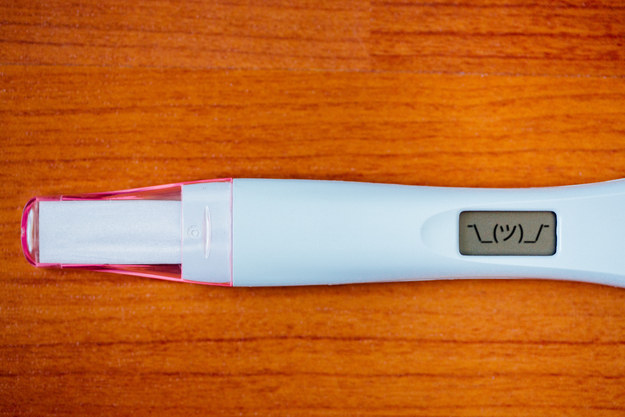Let’s talk about that thing where you bleed from your vagina every month.
Jenny Chang / BuzzFeed
Considering all the time you spend with your period, it’s still pretty damn mysterious. So to find out more, we spoke with two expert OB-GYNs: Dr. Lauren Streicher, associate clinical professor of obstetrics and gynecology at Northwestern University’s medical school, and author of Love Sex Again; and Dr. Mary Jane Minkin, clinical professor of obstetrics, gynecology, and reproductive sciences at Yale School of Medicine. Now, let’s get down to it:
Here’s what actually happens during your period:
Essentially, your whole menstrual cycle is designed to get you pregnant, says Streicher. When ovulation occurs in the middle of your cycle, an egg is released from the ovaries and moves to the fallopian tubes, where it could meet with sperm and get fertilized. Meanwhile, your body revs up production of the hormone progesterone, which thickens the lining of the uterus so that it’ll be ready for a fertilized egg to implant. But if no pregnancy occurs this month, those progesterone levels drop and that thickened uterine lining sloughs off. That’s your period!
But if you’re taking hormonal birth control, you’re basically getting a fake period.

Warner Bros. / Via graceofwolves.tumblr.com
If you’re using something like the pill, the ring, the IUD, or the implant, your period is a little different. Those hormones basically tell your body that it doesn’t need to produce more progesterone, says Minkin. Without that added progesterone, you don’t build up much of a lining each month, so your period tends to be a lot lighter. In most cases, you’re also not ovulating each month, though you can still ovulate with the hormonal IUD.
It is totally fine and healthy to get no period at all while on birth control.

FOX / Via gifbase.com
Like we said, it’s basically an impostor period, so if you have little to no bleeding while using the pill/ring/implant/IUD, that’s completely fine, says Minkin. Don’t ask questions, just go with it.
And skipping your period with birth control is fine, too.

You might get some breakthrough bleeding, but there’s generally no harm in taking birth control back-to-back without a period week, says Minkin. That’s actually how continuous birth control methods like Seasonale and Seasonique work. This can be really helpful for people with horrible periods or PMS symptoms, says Streicher. Just check with your doctor before you do it so she can answer any questions you have.
Toxic shock syndrome is VERY rare — so it’s fine to sleep with a tampon in.
http://okaymontana.tumblr.com/post/80767330068/im-making-embroidery-tampons-dad-said-they-were
Both experts swear this is extremely unlikely. Toxic shock syndrome (TSS) is a very rare but life-threatening complication that can happen as a result of a bacterial infection, and it was associated with the use of super-absorbant tampons in the past. When it was most prevalent in 1980, the rate was only 6 to 12 per 100,000 menstruating women (per the CDC). By 1986, that rate dropped to 1 in 100,000. And obviously tampons have changed even more in the last 30 years. That said, it can happen, so if you have a super-high fever, you’re nauseous, and your skin is flaking off (the major symptoms), call your doctor ASAP, says Minkin.
But really, you shouldn’t be too worried. It’s safe to leave a tampon in overnight, says Minkin. Just always use the least absorbant tampon you can get away with, and don’t forget about it. Seriously, both experts have had several patients come in with tampons that were left in and forgotten — and they were fine (though smelly).
Dark or brown period blood doesn’t mean you’re dying.

Netflix / Via thisgifneeded.tumblr.com
People tend to fixate on any little change in blood color, says Streicher, but you shouldn’t. “Bright red generally means more active bleeding. If it’s brown it means it’s been sitting around for a while [in the vagina].”
A missing period isn’t always a sign of pregnancy… but it usually is.

The most common cause of a missing period (if you’re of childbearing age) is pregnancy, says Streicher. But that’s obviously not the only reason it can be MIA. It could be stress, weight changes, extreme diet or exercise changes, or a whole host of health conditions (we’ll get to those in a bit). If you’re worried about it, check with your doctor.
The best way to beat period cramps is by taking an OTC pain reliever BEFORE they start.

Don’t be a hero. Cramps are caused by something called prostaglandins, which are released during your period. But taking an anti-inflammatory like Motrin or ibuprofen can actually block the production of more prostaglandins. “The mistake everyone makes is that they think they should use as little medication as possible,” says Streicher. “If you start to take medication the day before you get your period or the minute you see that first drop of blood, not only will it dramatically decrease cramping, but it will also decrease bleeding.”
If your cramps are severe, hormonal birth control can also keep prostaglandins in check. But if you’ve tried all that and you’re still curled up in the fetal position every month, see your doctor to make sure it’s not something else.
(Awesome cross-stitch via Etsy.)
PMS is seriously no joke, and it’s all your hormones’ fault.
Whether you get monthly moodiness, acne, migraines, diarrhea, exhaustion, anxiety, or even clumsiness, it might be related to the hormonal changes that occur during your period, says Minkin. Of course, if these things also occur during other times of the month, it might not be all your period’s fault, so it’s worth talking to a doctor if any of these are new or they seriously interfere with your daily life.
Just because you get a period every month, that doesn’t necessarily mean you’re ovulating.
Crazy, right? Getting a monthly period is actually not a guarantee of your fertility or ovulation, says Streicher. For instance, you can still have a period even if you didn’t release an egg that month, which is the case for anyone on hormonal birth control, but it can also be the case for other people with irregular cycles. If you’re having trouble getting pregnant, your doctor can help you determine if you’re actually ovulating.
You can get a monthly period and still not be ~regular~.

First of all, a “normal” period totally depends on the person. The average cycle is 28 days, but if you get your period every 23 days or every 30 days, that’s normal, too. What’s NOT regular is if the length of your cycle changes from month to month. So if you sometimes have 23 days between periods and sometimes have 30 days, that’s considered irregular — even though you’re still getting a period once a month. It might also be a sign that you’re not ovulating, says Streicher.
Occasional irregularities aren’t a big deal, but if your period is always unpredictable, it might be a problem for your future fertility.
Having wonky periods every now and then isn’t usually a cause for concern. But if you’re always irregular, you should talk to your doctor about it. It might be the result of a medical issue like a thyroid condition or PCOS, or it could just be from stress, says Minkin. The typical treatment is going on hormonal birth control to keep your periods regular.
Consistently irregular periods may be a sign that you’re not ovulating, so if you think you might ever want to get pregnant in the future, talk to your doctor about what your irregularities might mean for your future fertility — and if there’s anything you should know or do to preserve it. Here’s .
Pretty much any medical condition can mess with your periods.
Anything from heart disease and cancer to anorexia and thyroid conditions can affect your cycle, says Streicher. Gynecological conditions like ovarian cysts, endometriosis, PCOS, and uterine fibroids can also impact the length and severity of your periods. This definitely does NOT mean that any weird period issue is a sign that you have a more serious condition, but just know that if you have any of these conditions, it might affect your flow. And again, if you’re diagnosed with any of these conditions, make sure to talk to your doctor about what that might mean for your future fertility (even if you have no plans of getting pregnant just yet).
A little ~odor~ during or after your period is also normal, but there’s no need for scented tampons.

DreamWorks SKG / Via memegenerator.net
“The inside of the vagina should not smell, and all of those chemicals and perfumes and stuff can be irritating,” says Streicher. That said, it’s not uncommon for you to have some odor with your period, since your vaginal pH levels can get thrown out of whack. Just make sure you’re and you should be fine.
Spotting between periods is usually no big deal.

Oriontrail / Getty Images / Via instagram.com
Some people bleed a little bit during ovulation (around the middle of your cycle), but it can also happen for hormonal reasons or when you’re getting used to a new birth control method. It’s generally nothing to worry about, but if it happens all the time, tell your doctor.
Your period can start ~changing~ as early as your late 30s.
The average age to go through menopause is 51, but it’s not uncommon to notice some perimenopausal changes in your late 30s or early 40s, says Minkin.
Getting your period while pregnant is kind of possible.

Universal Pictures / Via instagram.com
OK, it’s not a real period, but about a third of women report bleeding in the first few months of their pregnancy, says Minkin. So it can look an awful lot like a period and it can definitely confuse people.
It’s normal for your genitals to feel a little tender and sensitive around your period.
Research shows your pain receptors actually change during your period, says Minkin. So maybe don’t schedule a wax right before you’re gonna bleed. It totally depends on the person, but feeling more sensitive down there (in a good way or bad way) is very normal.
Passing little clots in your period is normal, too.
They seem like a sign of impending death, but they’re actually nothing to worry about. “Clots mean that you’re bleeding heavily, but it’s not an indication of a specific problem, says Streicher.
But if you’re soaking through a pad or tampon more than every two hours, that might be an issue.
Super-heavy bleeding isn’t fun, and it might be a sign that you have a hormonal irregularity, infection or polyp, says Minkin. So if you’re running through pads and tampons like crazy, call your gyno.
In general, the only reason you should see your doctor about your period is if it changes drastically.

Loryn Brantz / BuzzFeed / Via
Like you’re suddenly bleeding A LOT, your period is lasting way longer than it usually does, or it’s been missing since February. Again, it’s probably nothing, but check with your doctor just in case, says Streicher.

















